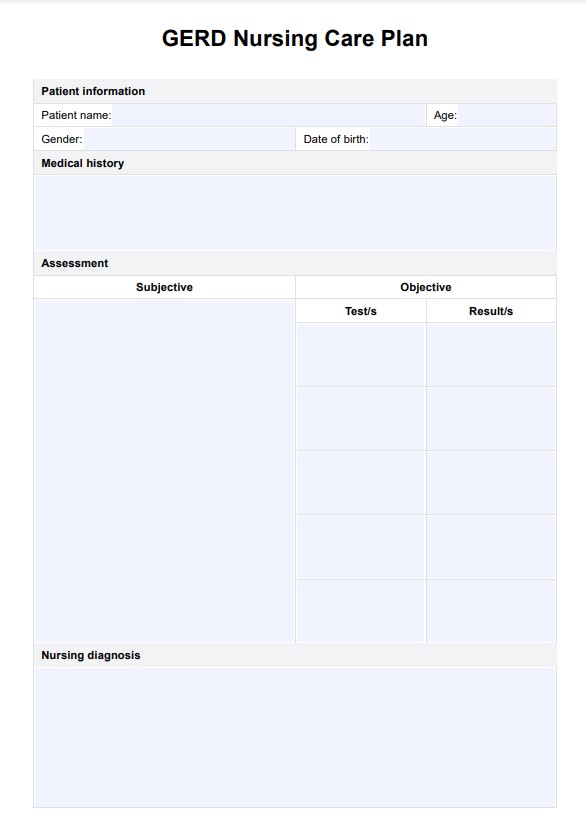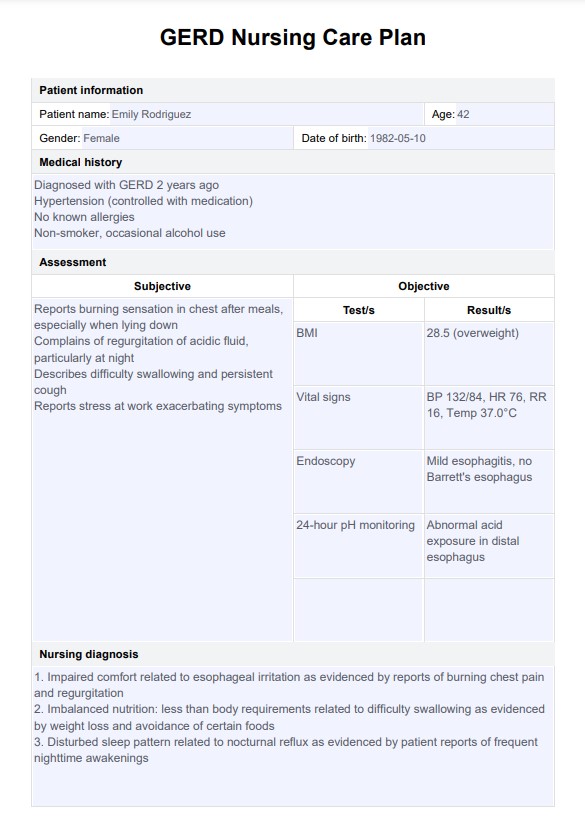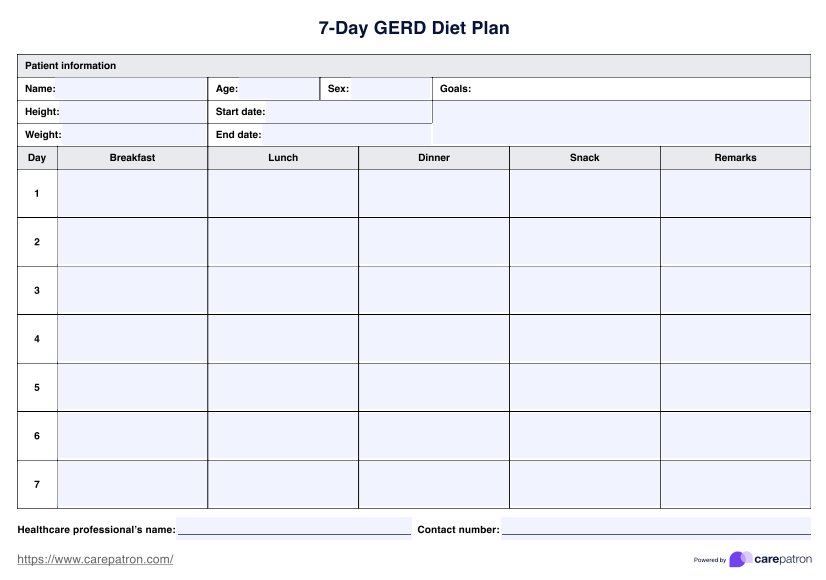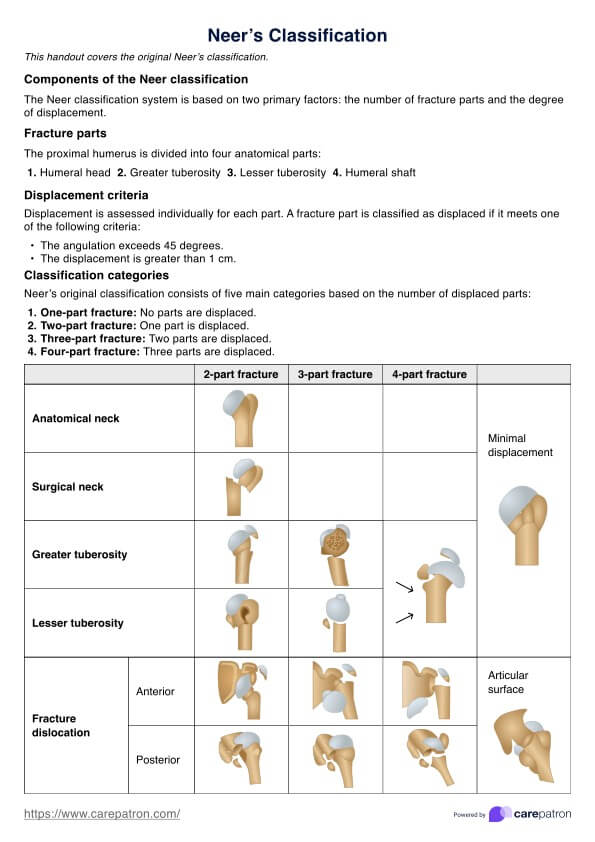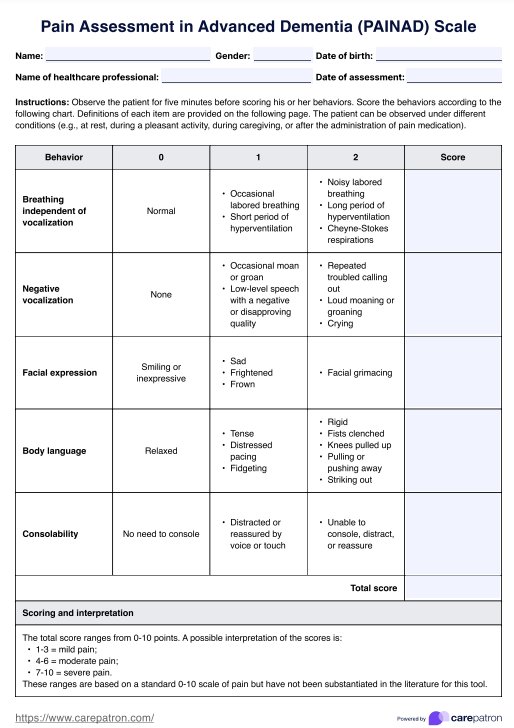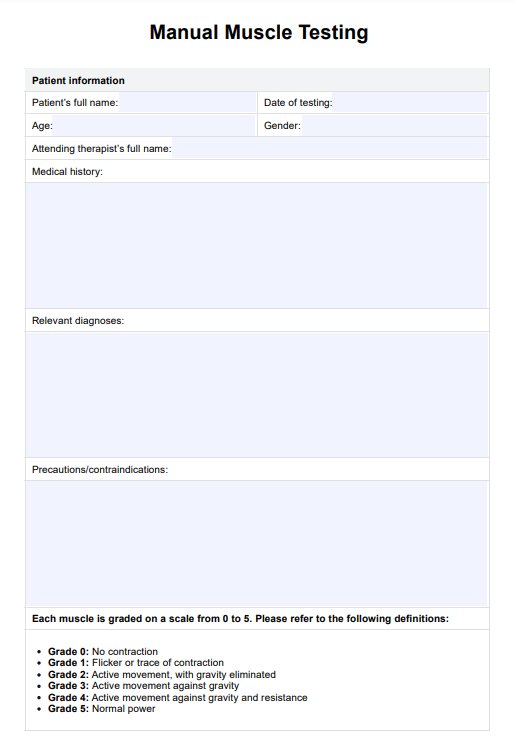Gerd Nursing Care Plan
Discover our comprehensive GERD Nursing Care Plan template with a detailed example. Ideal for healthcare professionals. Free PDF download available.


What is a GERD Nursing Care Plan template?
A GERD Nursing Care Plan Template is a structured tool used by healthcare professionals to document and manage the care of patients diagnosed with gastroesophageal reflux disease (GERD), which is a more severe form of acid reflux. This resource guides nurses and other medical staff to systematically assess, plan, implement, and evaluate the care provided to these patients.
The template typically includes sections for patient assessment, nursing diagnoses, planning and goal setting, interventions, rationale, and evaluation. Each section is designed to capture essential clinical notes and data critical to the clinical documentation process. This comprehensive approach ensures that all aspects of the patient's condition, including risk factors, symptoms, and other relevant health issues, are thoroughly addressed.
Using a GERD Nursing Care Plan Template, healthcare providers can create individualized care plans tailored to each patient's needs. Nursing care plans for GERD facilitate a more organized and efficient approach to patient care, enhancing the quality of care delivered. Moreover, the template's focus on detailed clinical documentation helps maintain accurate and up-to-date clinical notes, vital for ongoing patient management and communication among healthcare teams.
Gerd Nursing Care Plan Template
Gerd Nursing Care Plan Example
How does this template work?
Using a nursing care plan for GERD involves a series of systematic steps that help healthcare professionals create a personalized and comprehensive care plan for patients with GERD. Here's how it typically works:
Step 1: Patient information and assessment
The first step is to gather detailed information about the patient's condition. This includes symptoms, medical history, lifestyle factors, dietary habits, and current medications. This assessment forms the foundation of the nursing care for GERD patients.
Step 2: Setting nursing diagnoses
Based on the initial assessment, the healthcare provider identifies a specific nursing diagnosis for GERD. These diagnoses pinpoint the patient's health issues and challenges related to GERD, guiding the subsequent planning process.
Step 3: Planning and goal setting
In this step, the healthcare professional sets short-term and long-term patient care goals. These goals are specific, measurable, achievable, relevant, and time-bound (SMART), designed to address the nursing diagnoses identified earlier.
Step 4: Implementing interventions
The plan then moves into action with the implementation of various nursing interventions. These may include dietary recommendations, lifestyle modifications, medication management, and patient education. Each intervention is chosen based on its relevance to the patient's needs and goals. A rationale is also detailed to support the inclusion of each intervention.
Step 5: Document the evaluation
The effectiveness of the care plan is regularly evaluated against the set goals. This step involves monitoring the patient's progress, reassessing their condition, and making any necessary adjustments to the care plan.
By following these steps, healthcare providers can use the Printable GERD Nursing Care Plan Template to deliver structured, patient-centered care. This methodical approach enhances the quality of care and ensures that all relevant information is documented and easily accessible for ongoing patient management.
What are common nursing interventions for GERD?
As healthcare practitioners, understanding and implementing effective nursing interventions is crucial in providing comprehensive care for patients with GERD. These commonly include the following:
Medication administration and management
One of the primary nursing interventions for GERD is to administer prescribed medications as directed by the healthcare provider. Proton pump inhibitors (PPIs) are often the first-line treatment for GERD, as they effectively reduce gastric acid secretion. Nurses play a crucial role in ensuring patients understand the proper use of these medications and monitoring for potential side effects.
Dietary and lifestyle modifications
Modifying dietary habits is a key non-pharmacological intervention for managing GERD. Nurses should recommend that patients avoid trigger foods, particularly spicy foods, that can affect symptoms. Encouraging smaller, more frequent meals and advising patients to avoid lying down immediately after eating can help reduce reflux. These interventions aim to decrease pressure on the lower esophageal sphincter and minimize the likelihood of stomach acid refluxing into the esophagus.
Positional changes and sleep hygiene
Elevating the head of the bed and advising patients to sleep on their left side can significantly improve esophageal motility and reduce nocturnal reflux episodes. These positional changes can help alleviate acute pain associated with GERD and improve overall sleep quality.
Patient education and empowerment
Educating patients about GERD and its management is a vital nursing intervention. This includes providing information on the mechanisms of gastric acid production and the impact of lifestyle choices on symptoms. Empowering patients with knowledge about their condition can lead to better adherence to treatment plans and improved self-management skills.
When would you use this template?
The GERD Nursing Care Plan Template is an invaluable resource for various healthcare practitioners managing patients with gastroesophageal reflux disease. Here are some scenarios where this template is particularly appropriate:
Initial diagnosis of GERD
When a patient is first diagnosed with GERD, this template is an excellent tool for developing an initial care plan. It helps systematically capture all relevant information and set the course for effective management.
Multi-disciplinary care coordination
In cases where a patient's GERD management involves a team of healthcare providers (such as a gastroenterologist, dietitian, and primary care physician), the template ensures that all parties are on the same page regarding the patient's care plan.
Patient education and self-management
The template can be a teaching tool for patients, helping them understand their condition and the importance of various interventions in their treatment plan. This can empower patients to take an active role in managing their GERD.
Quality improvement and audit purposes
Healthcare facilities can use this template for quality improvement initiatives and auditing care plans to ensure they meet the required standards and effectively manage patients’ conditions.
Why is this template useful for nurses?
Utilizing the Free GERD Nursing Care Plan Template can yield various results crucial for healthcare professionals and patients managing Gastroesophageal Reflux Disease. Understanding these results is key to adapting care and improving patient outcomes. Here are some common results and their implications:
Improved symptom management
One primary result of implementing a care plan is the effective management of GERD symptoms such as heartburn, regurgitation, and chest pain. A decrease in the frequency and severity of these symptoms indicates that the interventions and lifestyle modifications are working.
Monitoring for complications
The template helps systematically monitor the patient for potential complications of GERD, such as esophagitis or Barrett's esophagus. Early detection of such complications can lead to timely interventions, preventing more severe health issues.
Assessment of treatment efficacy
Regularly updating the care plan based on the patient’s progress provides insights into the efficacy of prescribed medications and interventions. This can lead to adjustments in treatment, ensuring that the patient receives the most effective care.
Facilitation of communication among healthcare providers
Using a standardized Care Plan Template ensures that all healthcare professionals involved in a patient's care have access to the same information. This promotes better coordination and continuity of care.
Commonly asked questions
GERD nursing care plans are structured frameworks healthcare professionals use to assess, manage, and support patients with gastroesophageal reflux disease (GERD). These plans incorporate nursing diagnoses, interventions, and expected outcomes tailored to each patient's unique needs.
Interventions for patients with GERD include assessing and managing symptoms such as heartburn and regurgitation, educating patients about dietary modifications to avoid trigger foods, and promoting lifestyle changes like weight management and elevating the head during sleep.
When explaining GERD to a patient, it is important to describe it as a chronic condition where stomach acid frequently flows back into the esophagus, causing irritation and discomfort. Use simple language to explain common symptoms, such as heartburn and regurgitation, and emphasize that lifestyle factors, such as diet and weight, can influence the severity of symptoms.


